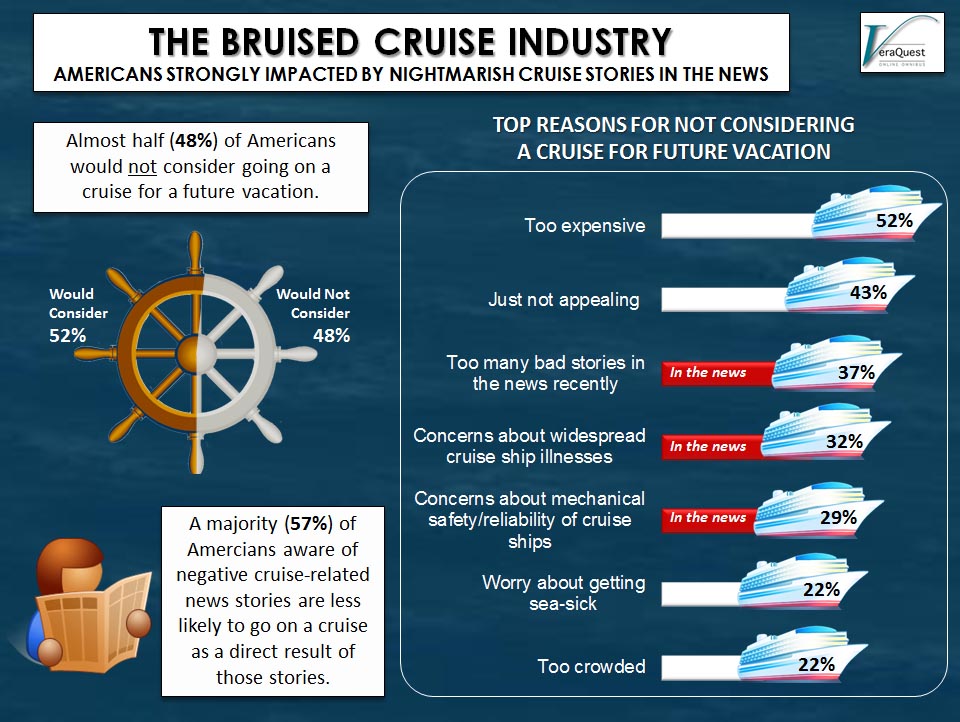Earlier this month, yet another cruise made the news…this one involved the Crown Princess and over 100 people that were hit with the norovirus bug as it was sailing off of Southern California. Perhaps it’s not as bad as the one I heard about in January though, where nearly 700 people aboard the Royal Caribbean Explorer of the Seas were experiencing vomiting and diarrhea (according to the CDC, this was the largest number of people sick on a cruise ship in the past 20 years). But neither can likely top the imagery of what it must’ve been like aboard the Carnival Triumph (a.k.a. the “Poop Cruise”) back in early 2013. The fire in the engine room left the boat floating in the Gulf of Mexico without its engines, no electricity, no air conditioning, and no working septic system for many days. Passengers reported “disgusting” conditions – sewage in the hallways, flooded rooms, limited food supply…ahh, best vacation ever.
These “hell cruises” certainly grab the headlines and the public’s interest. While I can cop to being intrigued by these stories as well, I read about them knowing that these news-making cruises with widespread sicknesses or mechanical malfunctions happen on such a small percentage of all the cruises out there. My family and I had an amazing time when we went on a cruise several years ago, and even with these stories, I wouldn’t hesitate to go on another one.
The rest of America, however, seems to be more strongly impacted by the nightmarish stories in the media. We asked 2,000 adults about their likelihood to cruise over the next year or two. Just over half (52%) indicate they will consider going on a cruise, versus just under half (48%) who say they will not consider a cruise for a future vacation. These days, Americans are far more likely to consider vacations that involve visiting family/friends (89%), visiting a city (82%), taking a road trip (81%), going on a beach vacation (75%), or vacationing at an amusement/theme park (68%). Camping/hiking (53%) is considered on-par with cruises, while Americans are less likely to consider taking a snow activities vacation (35%).
The price-tag does seem to be impacting Americans’ willingness to consider a cruise, first and foremost, with about half (52%) indicating that cruises are “too expensive”. Others who will not consider a cruise in the next year or two say it’s because cruises are “just not appealing” to them (43%). Both of those reasons I certainly understand. But many go on to say their unwillingness to consider a cruise is because of “too many bad stories in the news recently” (37%) or “concerns about widespread cruise ship illnesses” (32%), or “concerns about mechanical safety/reliability of cruise ships” (29%)…all the likely result of the media hype.

We proceeded to ask adults directly whether the news stories over the past couple years have impacted their likelihood to go on a cruise in the future. The majority (57%) of those aware of the news stories say that yes, they are indeed less likely to go on a cruise as a direct result of the news stories. Perhaps not too surprisingly, women are more negatively impacted than men (60% of women are less likely to cruise as a result of the news stories vs. 53% of men).
Americans’ trust in the cruise industry certainly appears to be shaken. I suppose the good news out of all this is that if my family and I decide to go on a cruise again, there are likely good deals to be had…
What would you be most afraid of happening on a cruise – widespread illness, mechanical failure, or something else? Would these fears stop you from climbing on board?
Leave a Reply